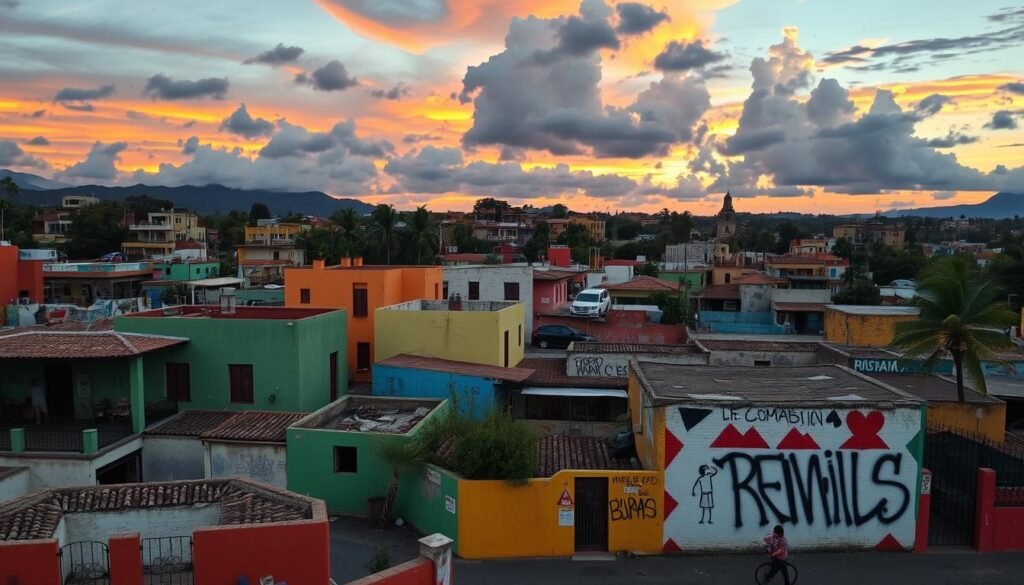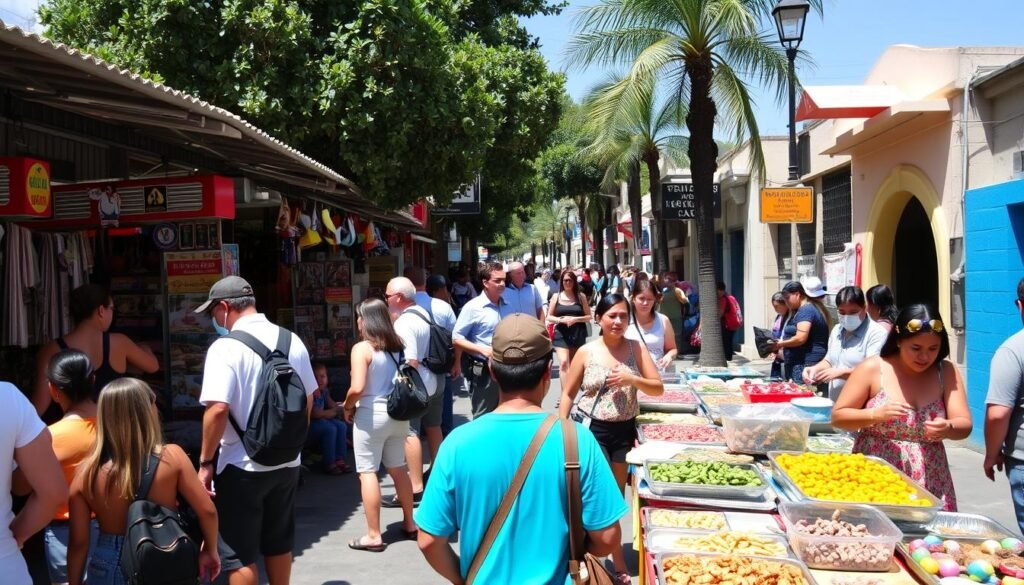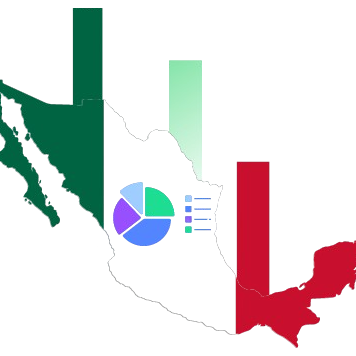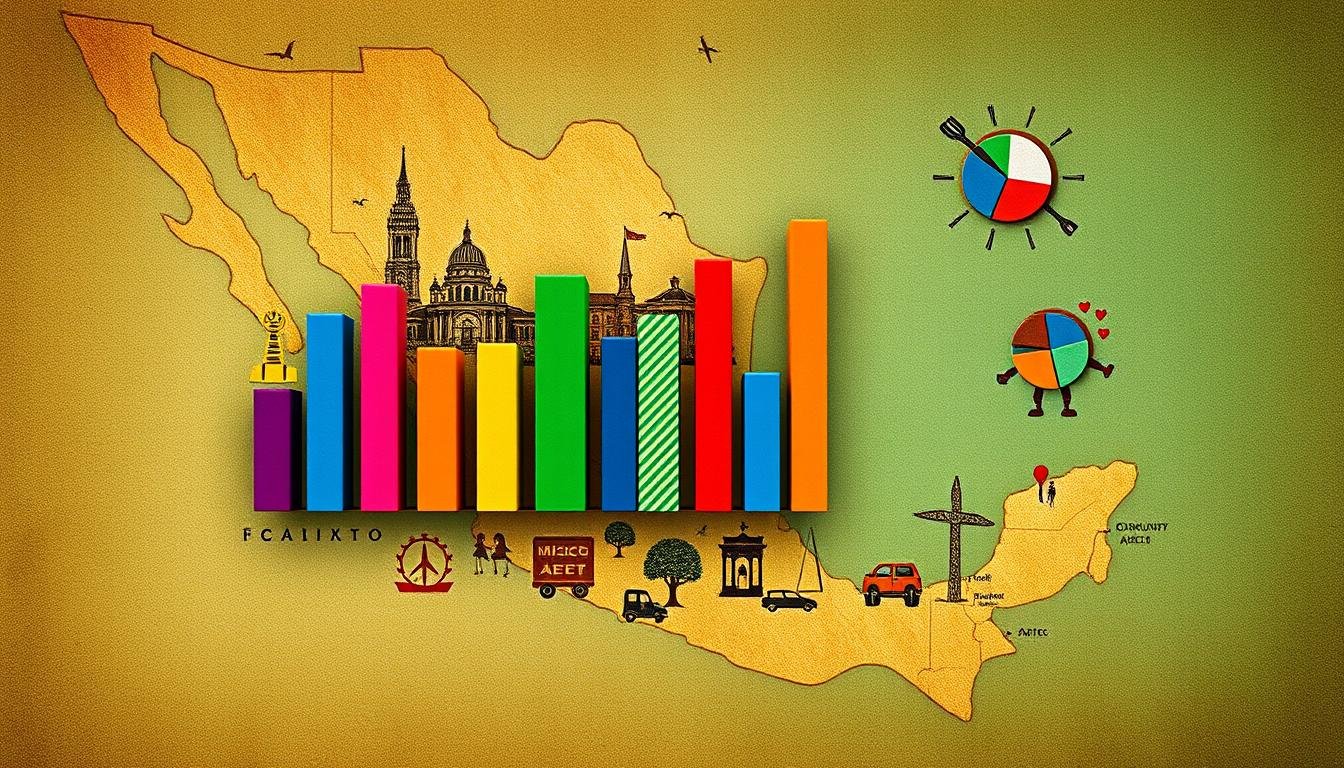Many think Mexico is a dangerous place, but the truth is different. The crime rates have actually gone down in recent years. This shows that things might not be as bad as the media makes them out to be.
Looking into Mexico’s crime, we need to ignore the rumors and wrong ideas. By seeing things clearly, we can understand the real issues. We’ll see how drug cartels and organized crime affect some areas but not all.
Key Takeaways
- Mexico’s overall violent crime rate has declined in recent years, challenging the widespread perception of uncontrolled violence.
- The media often sensationalizes and misrepresents the true nature of crime in Mexico, leading to exaggerated fears and misconceptions.
- While challenges persist, particularly regarding drug cartels and organized crime, the crime situation in Mexico is more complex and varied than commonly portrayed.
- Understanding the historical context and socio-economic factors contributing to Mexico’s high crime rates is essential for a nuanced perspective.
- Certain regions and cities in Mexico experience higher levels of violence, while other areas remain relatively safer for tourists and travelers.
Introduction to Mexico’s Crime Situation
Mexico’s crime scene is often misunderstood due to sensational media coverage. The truth is, the country faces big security issues but there’s more to the story. A balanced view is key to understanding the real situation.
Misconceptions and Media Portrayal
The media focuses on the most violent stories, giving a wrong idea of Mexico’s crime. Misconceptions about Mexico’s crime come from these stories, making people think the whole country is always in danger. The media portrayal of Mexico’s crime also doesn’t show the differences in crime rates across regions or the progress made in some areas.
The Need for a Balanced Perspective
To really understand Mexico’s crime, we need to look past the headlines. There are many places in Mexico with low crime rates and efforts to solve problems. A balanced perspective helps us see the whole picture.
We’ll explore more about Mexico’s crime situation next. We’ll look at the history, drug cartels, and how to make public safety better. By getting a full picture, we can find real solutions.
no so much fun facts about Mexico’s crime
Mexico’s crime situation is not as bad as many think. It’s important to know the truth from rumors. Let’s look at some facts that show Mexico’s crime rates are not as high as people say.
Debunking Misconceptions
The crime rate in Mexico has actually gone down in recent years. Many places in the country are safe for locals and tourists. The media often makes things sound worse than they are.
- Mexico’s homicide rate, while still high, has decreased by over 7% from 2018 to 2020.
- The majority of violent crimes in Mexico are concentrated in specific regions and do not affect most of the population.
- Many popular tourist spots, like Cancun and Cabo San Lucas, have lower crime rates compared to the national average.
These facts help clear up the wrong rumors about Mexico’s crime. They give us a clearer picture of what’s really going on.
| Metric | 2018 | 2020 | Trend |
|---|---|---|---|
| Homicide Rate (per 100,000 population) | 29.1 | 27.0 | Decreased by 7.2% |
| Violent Crime Rate (per 100,000 population) | 42.5 | 39.2 | Decreased by 7.8% |
| Property Crime Rate (per 100,000 population) | 24.8 | 22.6 | Decreased by 8.9% |
Understanding Mexico’s High Crime Rates
To understand Mexico’s high crime rates, we need to look at its history and the reasons behind it. We’ll see how historical events and economic issues have made this a tough problem. By understanding these factors, we can better grasp the challenges Mexico faces.
Historical Context and Contributing Factors
Mexico’s crime rates go back to a mix of historical events and economic issues. The drug trade, driven by demand from around the world, has led to violence. This has made powerful drug cartels and violence a big part of the country.
Corruption, weak institutions, and economic inequalities have made things worse. The drug trade causes cartels to fight, kidnap, and be violent to keep their power. This violence is hard to stop, with the government finding it tough to fight the criminals.
Corruption in government and law enforcement lets crime groups succeed. Without strong institutions and accountability, fighting crime is hard. This makes crime rates stay high.
- Socioeconomic inequalities and lack of jobs push some to crime for survival or money.
- Weak laws and poor police work let criminals do as they please, keeping violence going.
- Being close to the U.S. and the big demand for drugs there also helps the drug trade and violence.
Knowing the history and the complex reasons is key to fixing Mexico’s crime problem. We need to work on making the country safer and more secure.
Drug Cartels in Mexico: A Complex Issue
The drug trade in Mexico is a complex issue that has caught the world’s attention. Drug cartels, powerful groups, control this illegal trade. They affect Mexico’s social, economic, and political life. To understand this, we need to look at their beginnings, structure, and actions. We also need to see how they are fought.
Drug cartels started in the 1970s, making Mexico a key spot for cocaine trafficking to the U.S. Over time, they got into many illegal activities. This includes drug making, selling, extortion, kidnapping, and human trafficking.
Mexico’s drug cartels have a complex structure. They have a clear hierarchy with a top leader and many lower-level members. Each member has a specific job in the group.
- The Sinaloa Cartel is famous for its wide reach and tough methods. It’s one of the top cartels in the area.
- The Jalisco New Generation Cartel is known for its modern weapons and fighting with rivals and police.
Fighting drug cartels is hard for Mexico and its allies. Trying to stop their work, take down leaders, and cut drug flow has had mixed results. Cartels often bounce back and change their ways to evade capture.
| Key Drug Cartels in Mexico | Estimated Revenue | Primary Areas of Operation |
|---|---|---|
| Sinaloa Cartel | $3 billion – $5 billion | Sinaloa, Baja California, Sonora |
| Jalisco New Generation Cartel | $1 billion – $2 billion | Jalisco, Michoacán, Guanajuato |
| Gulf Cartel | $500 million – $1 billion | Tamaulipas, Nuevo León, Veracruz |
| Tijuana Cartel | $500 million – $1 billion | Baja California, Sonora |
We must understand drug cartels in Mexico deeply and fairly. By looking closely at these groups and the efforts against them, we can see the challenges Mexico faces. This helps us appreciate the hard work of the government and people in fighting for a safer future.

Violence in Mexican Cities: Localized or Widespread?
Crime and violence in Mexico vary by location. Some places are hotspots, but it’s not the whole picture. We’ll look at where violence happens and where it’s safer.
Analyzing Hotspots and Safer Areas
Crime in Mexico is often in certain cities or areas. These spots see more violence in Mexican cities because of drug cartels, gangs, and poverty. But, these areas don’t tell the whole story of Mexico.
Many parts of Mexico are safe areas with low crime and good security. They usually have strong police, active communities, and jobs, making them safer.
| City/Region | Crime Rate | Safety Level |
|---|---|---|
| Cancún | High | Moderate |
| Mérida | Low | High |
| Monterrey | Moderate | Moderate |
| Querétaro | Low | High |
Knowing about violence in Mexican cities and crime hotspots helps us see the full picture. This way, we can make better choices about where to go and stay safe.
Safety Concerns for Tourists and Travelers
Visiting Mexico can be exciting and rewarding, but safety is key. We need to be aware of the safety issues in this vibrant country. It’s important to know how to stay safe while traveling.
Travel Advisories and Precautions
It’s crucial to stay updated on travel advisories and take steps to stay safe in Mexico. Check the U.S. Department of State’s travel advisories for the latest on security in different parts of the country.
- Pay attention to any warnings or restrictions for specific states or cities, and adjust your travel plans accordingly.
- Research the local crime trends and hotspots in the areas you plan to visit, and avoid venturing into these high-risk zones whenever possible.
- Exercise caution when using public transportation, and consider using reputable taxi services or ridesharing apps instead.
- Keep your valuables secure and avoid displaying them openly, as this can make you a target for theft or robbery.
- Stay vigilant and trust your instincts – if a situation feels unsafe, remove yourself from the area immediately.
By staying informed and taking steps to stay safe, we can enjoy Mexico’s vibrant culture and beauty without worry.

| Precaution | Description |
|---|---|
| Avoid High-Risk Areas | Steer clear of neighborhoods or regions with known high crime rates or drug cartel activity. |
| Use Reputable Transportation | Opt for trusted taxi services, ridesharing apps, or private transfers to get around safely. |
| Keep Valuables Secure | Minimize the display of expensive items and keep your personal belongings out of sight. |
| Stay Vigilant | Trust your instincts and remove yourself from any situation that feels unsafe or uncomfortable. |
Corruption and Impunity: Challenges to Overcome
In Mexico, corruption and impunity are big problems in fighting crime. Despite efforts, making sure everyone follows the law and is accountable is hard. This is a big challenge.
Corruption is a big issue in Mexico, affecting many government levels and law enforcement. Officials often take bribes and misuse funds. This has made people lose trust in the government and its crime-fighting efforts.
- Corruption in Mexico is a long-standing issue, ranking 124th out of 180 countries in Transparency International’s 2020 Corruption Perceptions Index.
- Impunity often goes hand in hand with corruption, letting criminals get away with their actions. This makes violence and lawlessness worse.
- Challenges in combating crime in Mexico are made worse by a lack of accountability. People think the justice system is not fair or effective.
To fight corruption and impunity, Mexico has tried new laws, special units, and stronger courts. But, progress is slow. These problems are deeply set in place.
| Indicator | Mexico | Global Average |
|---|---|---|
| Corruption Perceptions Index (2020) | 124 | 86 |
| Convictions for High-Level Corruption (2019) | 12 | N/A |
| Impunity Index (2020) | 8.49 | 5.38 |
To fix corruption in Mexico and impunity, we need a complex plan. This includes strong political will, reforms, and working to make the law and accountability stronger at all government levels. Then, we can start to overcome the challenges in combating crime in Mexico.
Drug Trafficking Routes through Mexico
Mexico’s location makes it key in the global drug trade. Criminal groups have set up complex networks to move drugs from South America to the U.S. and other places. These routes go through Mexico, linking big drug production areas with big markets.
Transnational Criminal Organizations
Groups like the Sinaloa Cartel and the Jalisco New Generation Cartel work across borders. They use smart ways to move drugs like cocaine, heroin, and synthetic opioids from Mexico to the U.S. Their success has made them hard to stop.
These groups change their ways often to avoid getting caught. To fight drug trafficking, we need to understand how they work. This knowledge helps us make better plans to stop them.
FAQ
Is crime in Mexico really as serious as the media portrays it?
What are some surprising “no so much fun facts” about Mexico’s crime rates?
What factors have contributed to Mexico’s high crime rates?
How influential are the drug cartels and organized crime groups in Mexico?
Is crime in Mexico primarily localized or is it widespread throughout the country?
What are the main safety concerns for tourists and travelers visiting Mexico?
How do corruption and impunity in Mexico impact the fight against crime?
What is the role of drug trafficking routes in Mexico’s crime landscape?
Source Links
- https://www.latimes.com/california/story/2024-09-04/l-a-mayor-bass-to-make-lapd-chief-pick-this-month – L.A. Mayor Bass to make LAPD chief pick this month
- https://news.temple.edu/news/2024-09-04/nfl-bullish-international-expansion-it-working – The NFL is bullish on international expansion, but is it working?
- https://www.abqjournal.com/clickable/most-popular-dog-breeds-in-america/collection_37032117-9634-5fb9-a36c-28fce2cdcb47.html – Most popular dog breeds in America

